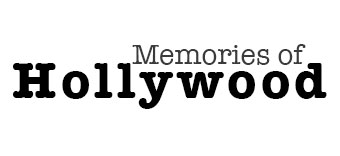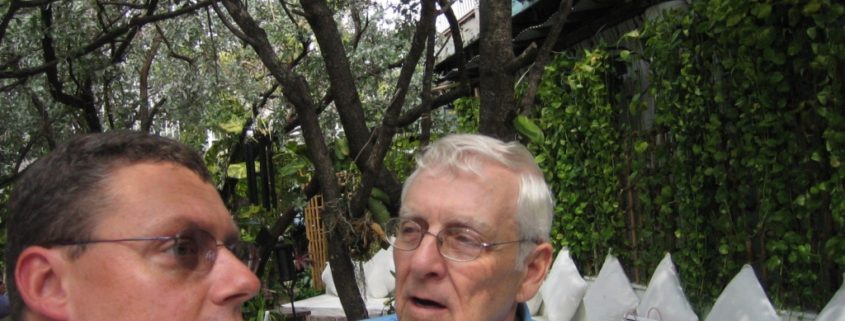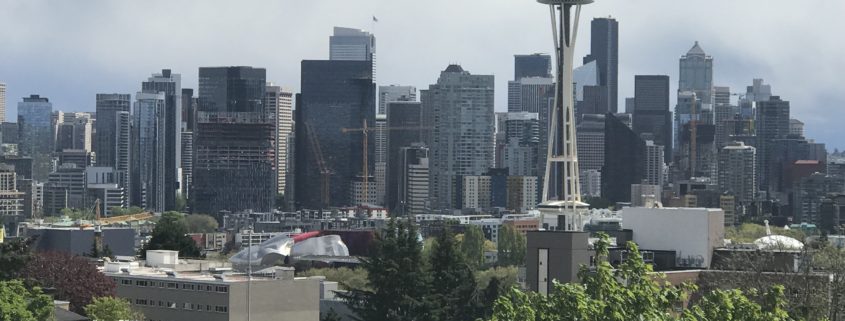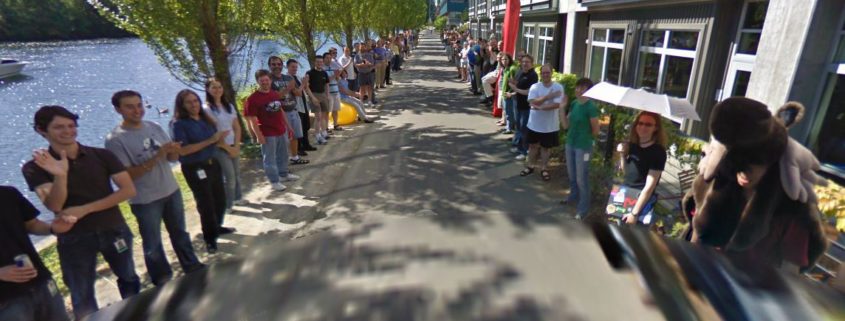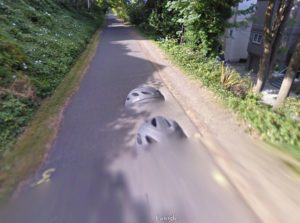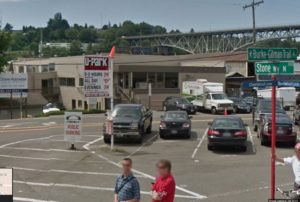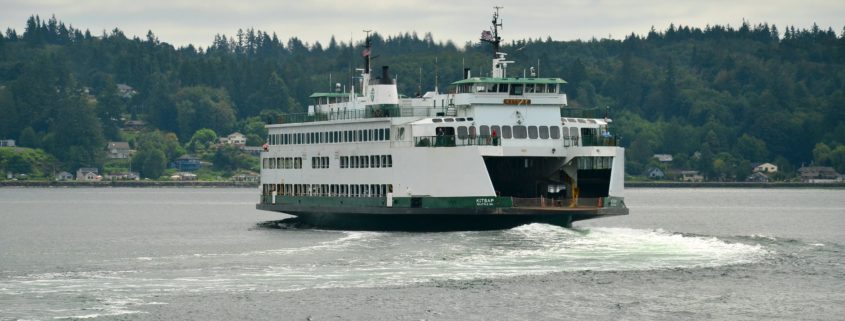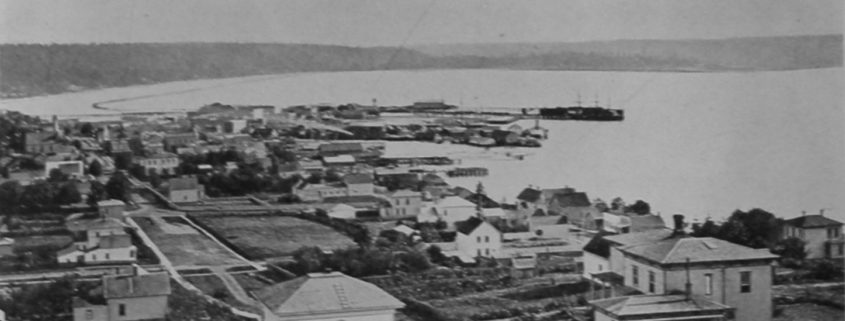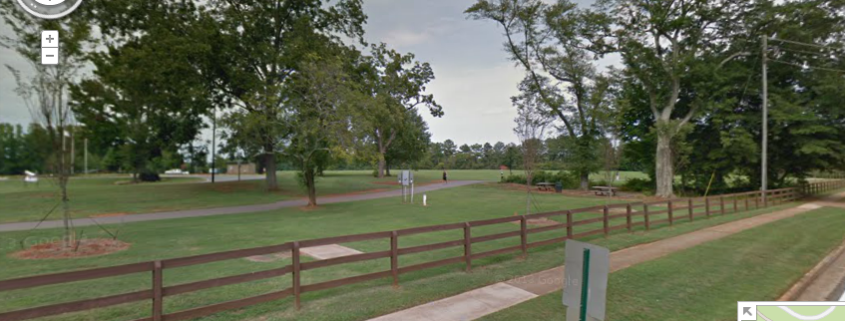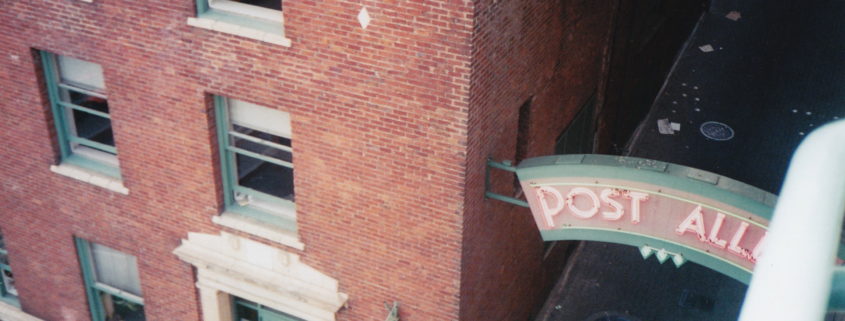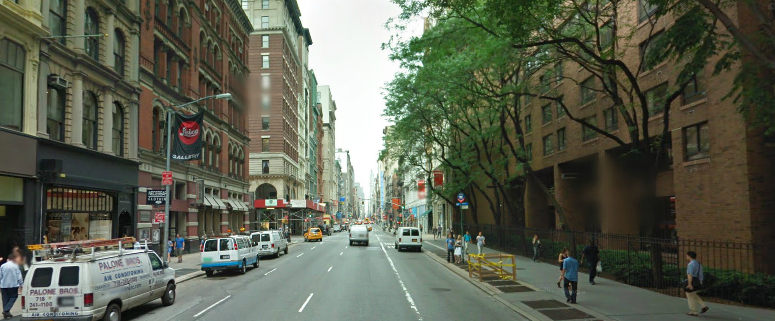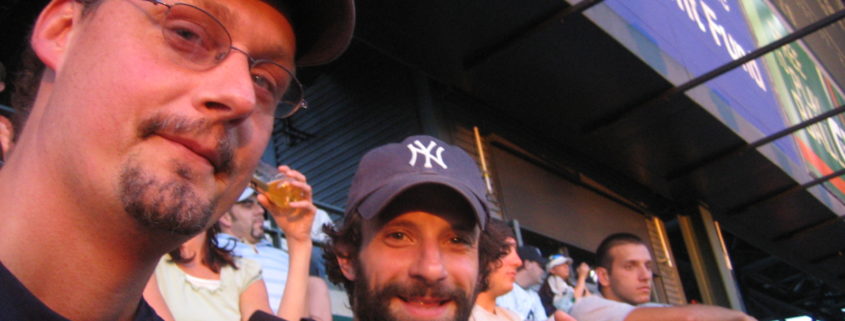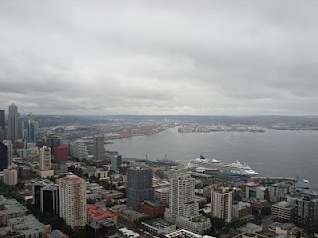Seattle Stories
One day (hopefully really soon) when all this is over, we’ll be compelled to go over, with friends and neighbors, lists of people we lost. Names and stories, fond remembrences. In fact, having to add these conversational stat sheets to our usually mundane observations about the weather or sports scores will become a permanent part of the culture. Well, maybe permanent until it wears away, as it inevitably will. But that’ll take a few years at least. Until then, though, there will finally be breathing space, time to reminisce and come out from behind our figurative masks long after the fabric ones have been dropped into landfills.
People will just assume that someone gone in 2020 will be for that one reason, the all encompassing pandemic. They can’t help but think it, it’s too much of our surface life. Everyone needs a shorthand. My mind goes there even now, I just assume. It’s easier.
My dad died in 2020, but don’t entertain those assumptions. For he died in stages starting around 2017 of Alzheimers and its myriad complications, a fall, partial paralysis, ending with an operation, fury and hospice.
Thanks for the condolences as you read this (really) but don’t assume I’m all torn up over this, not yet anyway. Maybe one day when all this is over there’ll be a reckoning. It’s already been 8 months though, and there’s no reckoning in sight.
I tend to say, “yeah, he’s gone, but we weren’t that close,” or, “he was kind of a dick, so, no worries, I’m good.” You might say that in some ways he died to me in little stages starting in the 1970’s. I knew I always wanted more, I knew I tended to hold out hope over the years, maybe he did too. I’ll never know. Occasionally these last few years I found myself fretting, wondering about my reaction upon hearing the news that he had died. Where would I be? What would I say? Would it fuck me up in some unsuspected way? It turned out I reacted pretty much the way I thought I would, with the big “wow”, perhaps, but after that pretty closed up.
I know though, there’s got to be more to it than this, I know it now because I’m a dad. I know it because of the way I look at my son in this kind of universal way. I suppose, I hope, that every father looks at his son with the same mix of pride, concern, wonder and hope that he is, deep down, just like himself (maybe with a few reservations). I know this, about how much I love my son, and what that look looks like to him. It’s easy to visualize, for some of my only memories of my own father growing up was about that look, but with me, his son, on the receiving end.
So there’s that. Seems it should be pretty easy now. I know my dad loved me because I remembered something that I now show my own son. Cut and dried, right? However, I remember a lot of other things too, I’ll call them contradictions. In memory the bad stuff, the contradictions, tend to accumulate more than the good stuff, the loving looks, but maybe that just depends on how you want to see things. It sure seems so, though, and in that way I’m probably like my own dad. I find myself increasingly wondering, what were some of his last memories regarding this?
Maybe in a few months or years, when we all start summating the stories of those we lost this year, I’ll simply add my own dad as a statistic. Just to make it easier, you know, and to discourage further discussion. “Yeah, he died in 2020 too, man.” Just leave it at that. But then this makes me think about my son, his expectations, and it leaves me a little embarrassed.
There’s always a reason to not deal with your shit, and this year has provided dozens of them across multiple levels. In a weird way, I’m kind of thankful for that. But I suspect it can’t go on forever, the undealt with issues just become complications down the road. The reckoning, as such, has to be reckoned with. Who knows, maybe I’ll surprise myself and try to tell dad’s story the best I know it, the good and bad together. This way maybe I can weed out and prevent the kind of complicated memories my own son could have about me, years down the road. And even further down his proverbial road, long after I’m gone and his own memories of me are tinged with nostalgia; I hope he can hold for himself a primary recollection, of a warm look of wonder, love and pride that dads give their sons.
People always wonder what it would be like to move back to a place that, because of distance, practically exists only in memory. When someone actually does it, there’s got to be a story in there, right? It’s got to be fascinating to move away from a place for, say, a decade, then go back to see what’s happened; settle down again, maybe try to make it the same as it was before. The same as when you were younger.
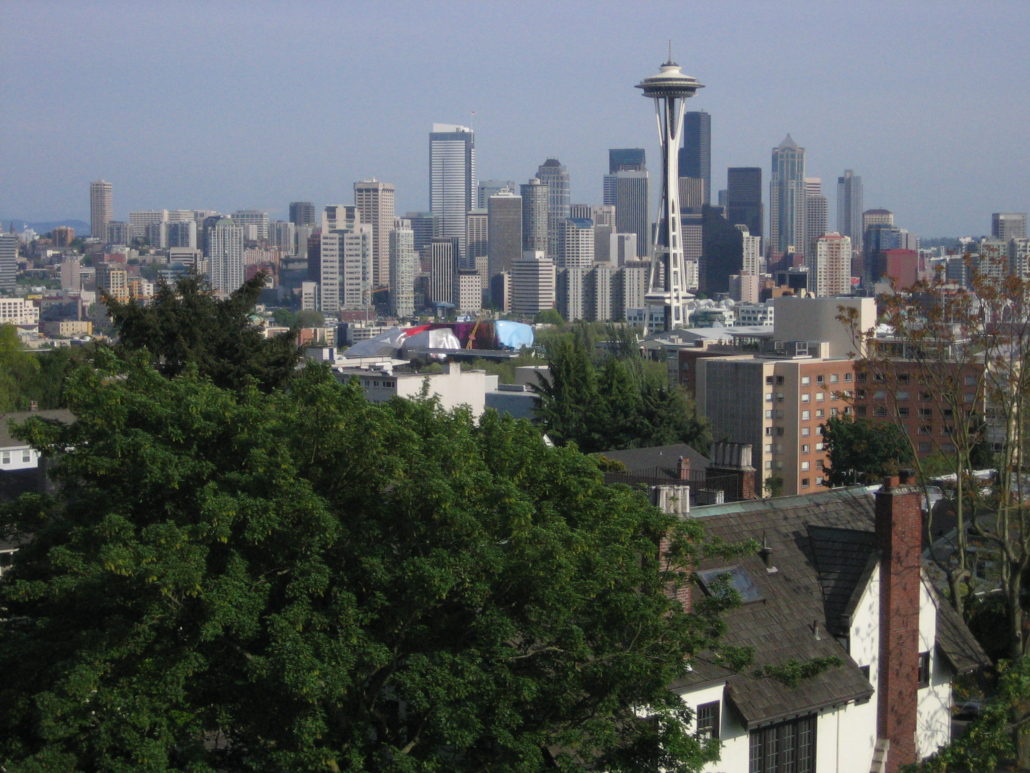
Of course you know that’s impossible, so I won’t even try to go there. Things are never the same as they were before. I know that, excuse me, I knew that.
I lived in Seattle for several years, and in that time I took the whole region to heart, then left for a decade (well, 11 years if you want to nitpick). My un-Washington years were spent north of Atlanta, where I got married, co-owned a house (which we spent years filling with stuff) and even had a baby, a glorious son. I achieved things there I never did on the West Coast, not even close. But still….
In all this time, I pined, I planned; I always wished in some vague overall way that we were back in the Northwest. But I had no idea how to make it happen, well, I did, but the expenditure of energy, gosh. Forget it. And the risk too, why not stand pat with a good thing, even though my experience told me things could be better?
So I waited. Then one day in 2018 my job offered me a transfer opportunity; and through a combination of our wanderlust, nostalgia, hope for the future and the fuck-it-ness brought about by the sheer exhaustion of raising a one year old, we took a few days to think and decided to go all in. It was a huge process, something I couldn’t have done alone, but luckily my unshakable wife took this all on with zeal and positive energy.
This story isn’t about the move, however, for everybody moves, right? This is America. It’s about what I found and am still finding after I got back to the Land of Pines.
My first thing was to drive around, drive everywhere, here there, with no destination. I was sure I still remembered more of the Seattle city layout after all the years away than I had ever learned as a near-Atlanta resident. I used to equate my refusal to learn all the Peachtree streets, avenues and the metro grid as a kind of organ rejection. GPS was my daily friend.
Unfortunately, at first anyway, it was also my friend in Seattle, even in the north end that I thought I knew so well. I used GPS to go back and forth from work to Renton. Renton is just south of Seattle and where we had landed after seemingly dropping out of the sky the first few days of 2019. My app reliance bugged me, I guess, because if I had remembered it all I could kind of fool myself into thinking maybe I’d never left. I got over it though, especially when I saw so many things and reacquainted with some of the people that were right where I had left them in 2007.
My sister said I came back here for the restaurants, because I kept going on about the old haunts that remained. And in a way she was totally right. In this I was seeking the old familiarity. And it was there, my old friends may have been a little older, most had touches of grey hair. Houses looked the same, sometimes a little different in ways I couldn’t place. But me and my old friends happily caught up and reminisced about old times. My wife and son are also in the process of making new friends here.
A week after arriving I started noticing physical differences between the then of 2007 and now. This should be the best part of a story like this because it’s what all my old friends asked me when I got back. It’s what people wonder. It’s what the people we left behind in Georgia ask about. OK, at first it was those green Lime bikes. So strange how I found them everywhere, laying down abandoned as if by fleeing Pripyat residents. Except for on the Seattle Waterfront, I’ve still never seen anybody riding them. Many times the sight of those bikes pulled me out of my reverie and jerked me back to present day Seattle, a city that has gotten a little bigger, and yeah, with a little more traffic. And oh, the horror of all of those mixed use mid rises that have popped up around Lake Union. Complaints about them are a pasttime here.
I tried to grouse at first too, to complain that they’d torn down the this or that to make way for something for Amazon or Google or whoever. Old Seattle was dead they said, and I tried to believe. I really did. But my heart simply wasn’t in it. I was too happy. For I was back and the pretty large amount of familiarity I’d immediately rediscovered was more than enough to tide me over until the other thing happened.
The other thing that happened was about three months after my return and it was a surprise. I no longer needed the GPS and abandoned it (‘after three months!’ you may say in astonishment, but hey, my job has me driving around everywhere). Accompanying my remembrance of the street layout I noticed stuff like why maybe this house looked different or why I couldn’t remember a certain Roosevelt Avenue business there. The house had been painted of course (I remembered the old color), and that business used to be a Magnolia hi-fi. I was suddenly able to pick out all the new buildings that had gone up since I’d left, the little ones you know, not the architectural obviousness of Lake Union. I remembered the hoarder lady on 45th Ave and where the Sci Guy parks his car near Green Lake. My residential memory had returned. After three months I felt as though I had never left.
The other day I bragged to my wife that I’d informed a couple of people I had just met that I had been a “Seattle resident for twenty years.” At first I didn’t get her disappointed expression but then I realized the inherant denial of my Georgia years implied by that statement. I didn’t mean to do that, for I am proud of my time there, of my wife and my son. I guess I was so excited that full memory of this place had returned that it felt like the truth. And in that memory’s return, I not only felt good again, but even a little younger, not like it was before, but I’ll aver, damn near close!
So now I have unexpected answers to the questions, “What’s it like? What’s different, what’s the same?” All of the things I can see are different, that you can see too but maybe they do not matter so much, would have changed whether I was here or not; the heavier traffic, the skyscrapers. Residents know all this already, it took a while to realize this is not what they’ve been wanting to know.
Nothing has changed, nothing at all. Granted there is a lot that is different on the surface, sure, but I don’t complain. Because it all folds into the experience of the city, the region, the state. It’s all good because this is my town, and it seems it always has been. I do not regret moving away years ago because apparently it’s always been in me. I’m back, but by now it lacks the drama I always imagined would remain when I was Back East.
If you do decide to leave a place you love, try not to stay away too long, maybe no longer than fifteen years. It takes a bit of time for the remembered sights to become familiar again; of the bald eagles flying by the freeway, the sunbreaks and how on a windy day the water on one side of the floating bridge looks so different than on the other side. And speaking of all this, I have things I’ve gotta do, the sun just came out and I’ve got to go grab a piece of the PNW.

Google Maps Street View is the anti-Stanton. It’s aim seems to be to achieve the exact opposite of Brandon Stanton’s book “Humans of New York.” Using what might be called “facial derecognition software” all human faces are blurred out, sometimes to funny effect, but sometimes it’s a little chilling. You’ll never find a better illustration of this than on the Burke-Gilman Trail in Seattle.
Instead of having a camera mounted on top of the car, this one was mounted on a pole at the back of the photographer’s bicycle while he rode along from one end, the Sammamish River Trail in Kenmore, all the way to Ballard, where he stopped at the Missing Link (a section of un-Trail that Trail activists have been looking to fill in-to connect to another segment just north).
You look at these pics and have to wonder, who are these people? What are they doing now? Do they even realize they’ve become blurred out non-persons on the Burke-Gilman?
In “Humans of New York,” individuals are zoomed in on, stopped temporarily, and asked if they’d like to offer something personal about their life experience, how they’re feeling etc. When you zoom in on the humans of the Burke-Gilman all you get are things like this, a human walking near the University of Washington:
Sometimes when you get to an intersection, the date on the picture will zoom a few years ahead and you can see what has changed. This view, like all of those from the Trail route run, dates from July ’09.
The only thing that has really changed here, almost exactly 5 years later, is that the price of parking has gone up.
Sometimes you see someone who simply looks as if they’ve been standing there the whole time, waiting for passers-by. The anonymity of Trail-goers on any other day is a given; people pass by too fast to say hello to; except in the mornings, when everybody seems to be in a better mood. Here, anonymity is made a certainty.
The ah-ha moment with Stanton’s book comes when you realize that even with all these various stories of pain or happiness; stories that can make them seem so different; people everywhere are pretty much the same. It’s comforting yet also kind of exciting, even addictive. Google Maps; however has rendered these resting workers (on the Trail around Lake City) inert, with no story to tell.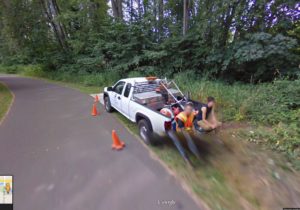
Here’s a strange shot of the Google photographer changing his shirt (or something) while riding along: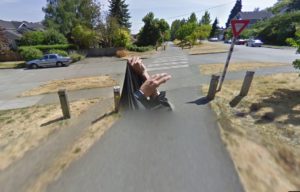
Then this view from Fremont from ’09: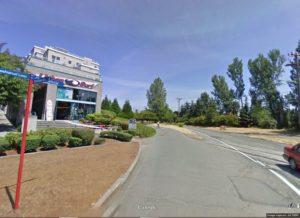
And another in ’14, where the median has been taken away but the red car on the right seems oddly like the same one from 5 years earlier. This view was made available by “stepping to the right” with the mouse.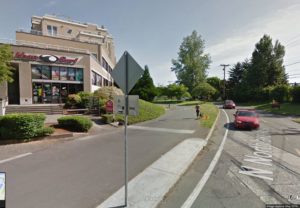
Here is one of many generic bicyclists who can be found along the Trail: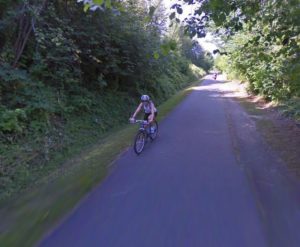
Somehow, along the way in Fremont, people were warned of the approach of the Google Bike; perhaps the greeting was so nice the powers that be decided not to neuter any of their identities:
It seems odd that Google Maps would even be interested in visually cataloging this trail; the appeal, I suppose, is more for those like me, those who want to make virtual journeys or trips down memory lane. But the more you look, the more you can’t help but wonder who those faceless people are.
How long does it take someone to truly absorb their adopted home? A few months, several years, perhaps immediately? It’s easy to move to a place you like, to know you’ll eventually bond to it; so what is with that weird period of denial, of having to get used to? Maybe it’s missing the old place, and maybe that’s true for some, but in my case it was just good old healthy cynicism.
OK, this one isn’t about long ago days in Hollywood or about growing up (finally) in New York. This one is a little bitter, maybe even caustic. It’s time to vent. I vent because some people think they can make you care, and….despite their cloying efforts, you just don’t.
One of the best theoretical questions out there is this: “If you had a one-time-only use of a time machine, when and where would you go?” Of course this query should invoke a seriously wide variety of responses, all of which, however, would fit into only 3 categories:
1) “I want to go back and change something in my personal past,” like perhaps going to a certain college, or maybe hanging out with a deceased loved one a little more.
2) “I want to go back and be a fly on a wall for some awesome event or era,” maybe the painting of the Sistine Chapel or to just live during the Roaring Twenties.
3) “I want to go back and change history,” like possibly making sure Hitler got accepted into art school or maybe infecting Lee Harvey Oswald with Ebola so he won’t be at work the day the Kennedy Motorcade passes by.
I love being tracked. I know people nowadays have concerns about the NSA snooping into their business and whatnot; civil liberties: blah blah blah; but I just look at all that as a sign that somebody somewhere cares. It’s comforting to me. I realize this attitude may come about as a result of negligent parenting, but I try not to dwell on the whos or whys too much.
I lived in New York for 12 years. In that time I went through a lot of stuff, I guess like anybody would over a 12 year span. But I finally decided I wanted something better (and I say that full in the knowledge that I consider New York to be the best city in the world). The City was a place of endless wonder, but I was lacking something. I wasn’t living up to the potential of the Energetic Metropolis. I needed to find for myself a different definition of potential.
By the late ‘90’s I had realized things were not what they seemed. There needed to be a change, things had gotten stagnant. Not being very good at self-delusion, I knew there had to be an alternative. Historically, I had been an imperfect student to an imperfect teacher.
My mom was like the mom in “The Glass Menagerie.” As a kid, I resented her alternating perkiness and morosity. Perversely, I guess I resented the perkiness even more. During my teen years, she’d wake us siblings up early on weekend mornings and make breakfast. She’d bop around the apartment singing and uttering silly things. There was disdain in the air, and it was coming only from me, for I thought we should all be depressed. In my mind, we weren’t “successful,” and I felt a hot embarrassment that would flare up hotter the happier she would get. As I’d clamber out of bed I’d often mutter, “I’ll rise but I sure won’t shine.”
Some people are born and grow up in one place, sometimes even one house. Then there are others who move a couple of times, maybe even to different cities. Then there’s my family. We moved around like neurotic nomads from place to place within cities; and then from coast to coast, ricocheting back and forth in ever widening caroms.
Probably the only thing that kept us in the same country is that we never had passports or much money.
I’ve been in and out of health food stores for almost twenty years and seen so many people come and go they’d probably fill Key Arena. I could look around this arena and easily not remember more than half of them.
Of the ones I do remember, there was Kitty, and Squanch, and a self-described ’30 something virgin’ named Elderberry (who we called Eldercherry). There was a guy whose name I don’t remember but who answered the phone “Hello sir or ma’am, thank you for calling Perelandra.”
I saw that it was 4:55 am; I never let the alarm wake me up. It’s not that I didn’t set it, I did; I just always seemed to wake myself up right before. It’d been that way for years, and had become part of my morning ritual. Like shaving in the shower, or downing a cup and half of coffee on my way out the door (even though I invariably brewed a whole pot).
It was still dark out, with a few glimmers of light, as I left my house at 5:45 am and clambered into my Ford Focus. The days were quite long here this time of year, and I had plans for later, so that was good. For the Yankees were in town, and there was a night game (which would be played mostly in daylight here in Seattle).
Seattle’s a great place to go if you want to access your inner hippie. If you think you know a lot of things but want to give it a test and need a proving ground, I recommend you try the fertile volcanic soil of the Great Northwest. That’s what I did. I’d worked at a little Natural Foods store in New York for four years and thought I was a hotshot, a real Granola. But I got schooled in Seatown, that’s for sure.
